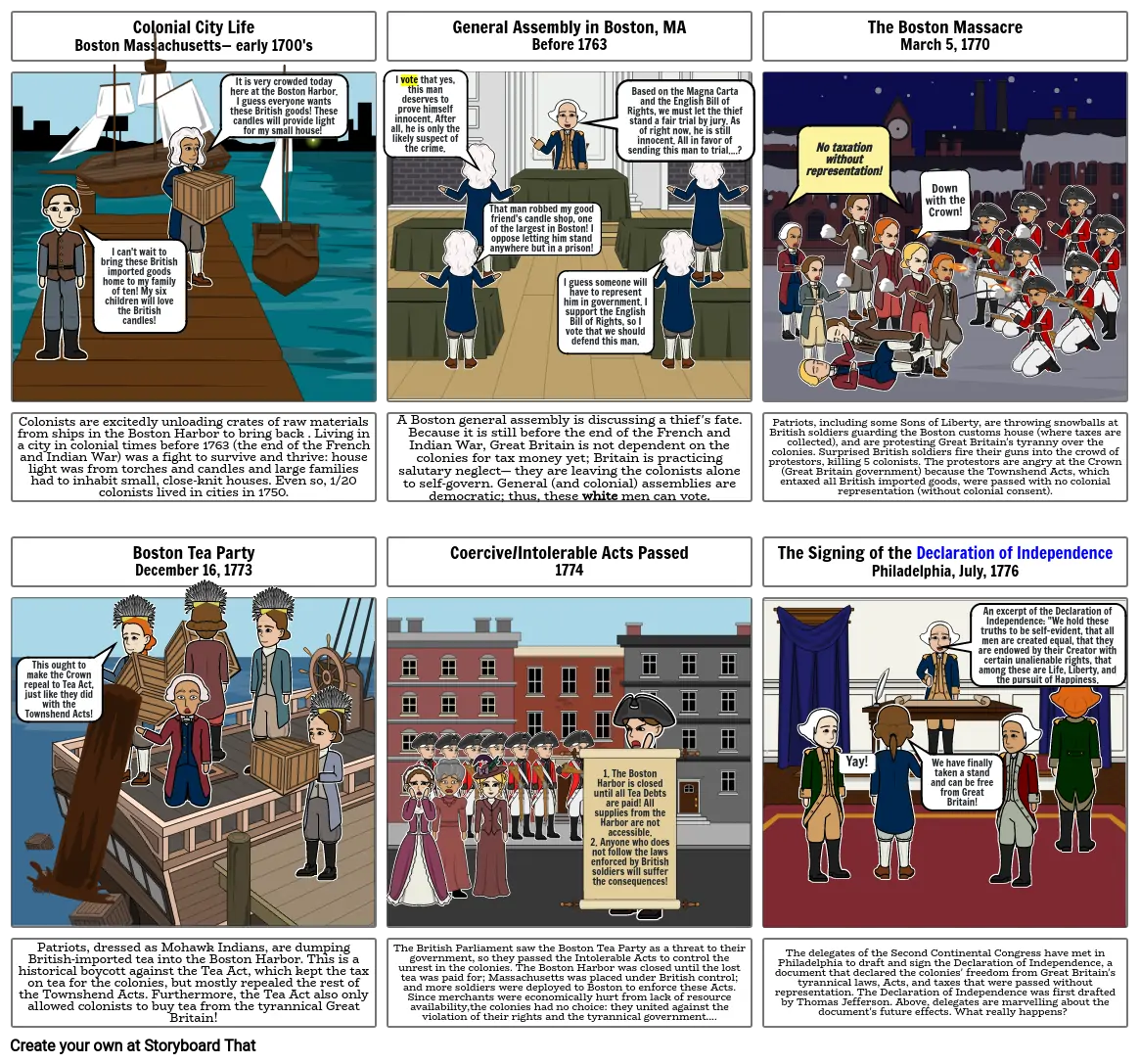Chloe Spears: Storyboard Project

Storyboard Text
- Colonial City LifeBoston Massachusetts— early 1700's
- I can't wait to bring these British imported goods home to my family of ten! My six children will love the British candles!
- It is very crowded today here at the Boston Harbor. I guess everyone wants these British goods! These candles will provide light for my small house!
- I vote that yes, this man deserves to prove himself innocent. After all, he is only the likely suspect of the crime.
- General Assembly in Boston, MABefore 1763
- That man robbed my good friend's candle shop, one of the largest in Boston! I oppose letting him stand anywhere but in a prison!
- I guess someone will have to represent him in government. I support the English Bill of Rights, so I vote that we should defend this man.
- Based on the Magna Carta and the English Bill of Rights, we must let the thief stand a fair trial by jury. As of right now, he is still innocent. All in favor of sending this man to trial....?
- The Boston MassacreMarch 5, 1770
- No taxation without representation!
- Down with the Crown!
- Colonists are excitedly unloading crates of raw materials from ships in the Boston Harbor to bring back . Living in a city in colonial times before 1763 (the end of the French and Indian War) was a fight to survive and thrive: house light was from torches and candles and large families had to inhabit small, close-knit houses. Even so, 1/20 colonists lived in cities in 1750.
- Boston Tea PartyDecember 16, 1773
- This ought to make the Crown repeal to Tea Act, just like they did with the Townshend Acts!
- A Boston general assembly is discussing a thief's fate. Because it is still before the end of the French and Indian War, Great Britain is not dependent on the colonies for tax money yet; Britain is practicing salutary neglect— they are leaving the colonists alone to self-govern. General (and colonial) assemblies are democratic; thus, these white men can vote.
- Coercive/Intolerable Acts Passed1774
- Patriots, including some Sons of Liberty, are throwing snowballs at British soldiers guarding the Boston customs house (where taxes are collected), and are protesting Great Britain's tyranny over the colonies. Surprised British soldiers fire their guns into the crowd of protestors, killing 5 colonists. The protestors are angry at the Crown (Great Britain government) because the Townshend Acts, which entaxed all British imported goods, were passed with no colonial representation (without colonial consent).
- The Signing of the Declaration of IndependencePhiladelphia, July, 1776
- An excerpt of the Declaration of Independence: "We hold these truths to be self-evident, that all men are created equal, that they are endowed by their Creator with certain unalienable rights, that among these are Life, Liberty, and the pursuit of Happiness.
- Patriots, dressed as Mohawk Indians, are dumping British-imported tea into the Boston Harbor. This is a historical boycott against the Tea Act, which kept the tax on tea for the colonies, but mostly repealed the rest of the Townshend Acts. Furthermore, the Tea Act also only allowed colonists to buy tea from the tyrannical Great Britain!
- The British Parliament saw the Boston Tea Party as a threat to their government, so they passed the Intolerable Acts to control the unrest in the colonies. The Boston Harbor was closed until the lost tea was paid for; Massachusetts was placed under British control; and more soldiers were deployed to Boston to enforce these Acts. Since merchants were economically hurt from lack of resource availability,the colonies had no choice: they united against the violation of their rights and the tyrannical government....
- 1. The Boston Harbor is closed until all Tea Debts are paid! All supplies from the Harbor are not accessible.2. Anyone who does not follow the laws enforced by British soldiers will suffer the consequences!
- The delegates of the Second Continental Congress have met in Philadelphia to draft and sign the Declaration of Independence, a document that declared the colonies' freedom from Great Britain's tyrannical laws, Acts, and taxes that were passed without representation. The Declaration of Independence was first drafted by Thomas Jefferson. Above, delegates are marvelling about the document's future effects. What really happens?
- Yay!
- We have finally taken a stand and can be free from Great Britain!
Over 30 Million Storyboards Created

